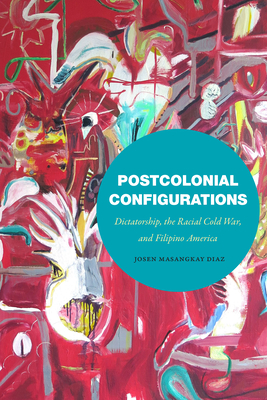Postcolonial Configurations: Dictatorship, the Racial Cold War, and Filipino America

Postcolonial Configurations: Dictatorship, the Racial Cold War, and Filipino America
In Postcolonial Configurations Josen Masangkay Diaz examines the making of Filipino America through the dynamics of dictatorship, coloniality, and subjectivity. Diaz explores how the Ferdinand Marcos dictatorship and US policies during the Cold War that supported the regime defined the relationship between "Filipino" and "America" in ways that influenced the creation of a gendered and racialized Filipino American subject. By analyzing Philippine-US state programs for military operations, labor and immigration reform, and development and modernization plans, she shows how anticommunist liberalism and authoritarianism shaped the visibility and recognition of new forms of Filipino subjectivity. Tracing the rise of various social formations that emerged under the Marcos regime and US programs for liberal reform, from transnational Filipino and US culture and the immigrant returnee to the New Filipina woman and the humanitarian English teacher, Diaz positions literature, film, periodicals, and other cultural texts against official state records in ways that reconceptualize the meanings of Filipino America in the Cold War.
PRP: 241.34 Lei
Acesta este Prețul Recomandat de Producător. Prețul de vânzare al produsului este afișat mai jos.
217.21Lei
217.21Lei
241.34 LeiLivrare in 2-4 saptamani
Descrierea produsului
In Postcolonial Configurations Josen Masangkay Diaz examines the making of Filipino America through the dynamics of dictatorship, coloniality, and subjectivity. Diaz explores how the Ferdinand Marcos dictatorship and US policies during the Cold War that supported the regime defined the relationship between "Filipino" and "America" in ways that influenced the creation of a gendered and racialized Filipino American subject. By analyzing Philippine-US state programs for military operations, labor and immigration reform, and development and modernization plans, she shows how anticommunist liberalism and authoritarianism shaped the visibility and recognition of new forms of Filipino subjectivity. Tracing the rise of various social formations that emerged under the Marcos regime and US programs for liberal reform, from transnational Filipino and US culture and the immigrant returnee to the New Filipina woman and the humanitarian English teacher, Diaz positions literature, film, periodicals, and other cultural texts against official state records in ways that reconceptualize the meanings of Filipino America in the Cold War.
Detaliile produsului











